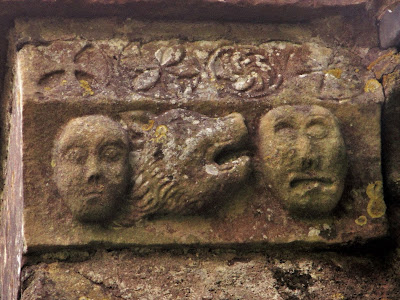Look, a church. But first a walk up the narrow lanes to the local iron age hill fort, Small Down Camp.
Though not before a pause at the nearby dew pond, across which a brisk wind was flitting.
As soon as we got up onto the top of the hill, we realised that the wind was more than brisk. In fact, it had put its teeth in, and they were bloody great fangs. It was wolfish.
The hill fort is impressive but quite small, so it doesn't take too long to beat the bounds.
We headed for the trig point.
Chesterblade and beyond from the trig point
View over to Glastonbury Tor, eight miles away
Looking over towards Bath
After a while, it looked as if it might rain so we decided to return to the village.
It was much more sheltered down in the lane.
My first primroses of the year
Looking back at the hill fort, we saw it had taken on the appearance of a great ship.
While Bob and Tess popped into the cottage to put the dinner on, Sara, the Northerner and I wandered over the road to the tiny Church of St Mary the Virgin (which is actually a Norman chapel) to have a bit of a fossick.
The etymology of the placename Chesterblade is interesting. Obviously, the Chester- bit comes from castra, which is Latin for camp or stronghold. The -blade has all sorts of suppositions attached to it. The one I favour is that it's from Bladji, meaning 'of the wolf'.
The bellcote
And here he is in the South Nave doorway.
And here beneath the North-East Nave coping. Look at this magnificence! Chesterblade is definitely the Stronghold of the Wolf!
I thought this might be the fate of Robb Stark in reverse: a (dire)wolf with a human head, but apparently it's the Lamb of God, this carved on the South-East Nave coping. Hmmm.
There's also a rather desolate Virgin Mary above the South Nave door ...
... and this face that looks like a bad doodle.
 Inside, the Church is compact and bijou ...
Inside, the Church is compact and bijou ... ... and a bit dusty or ghostly, depending on your point of view.
The font is Norman.
The panelling is Jacobean.
The yew tree looks like a menorah.
And lunch was delicious, and the road home happy.
























































